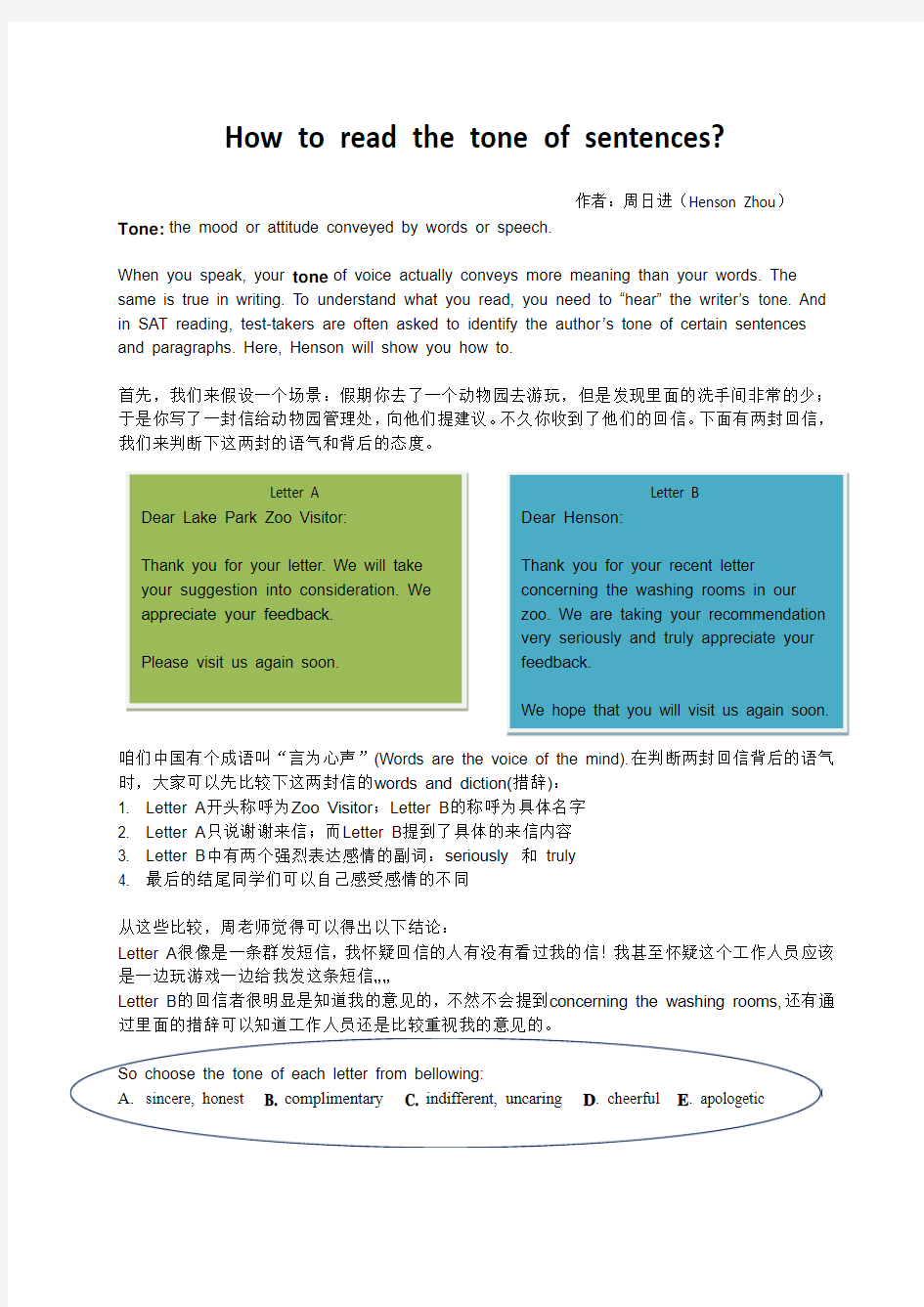How to identify the tone(如何识别句子语气)


How to read the tone of sentences?
作者:周日进(Henson Zhou)Tone: the mood or attitude conveyed by words or speech.
When you speak, your tone of voice actually conveys more meaning than your words. The same is true in writing. To understand what you read, you need to “hear” the writer’s tone. And in SAT reading, test-takers are often asked to identify the author’s tone of certain sentences and paragraphs. Here, Henson will show you how to.
首先,我们来假设一个场景:假期你去了一个动物园去游玩,但是发现里面的洗手间非常的少;于是你写了一封信给动物园管理处,向他们提建议。不久你收到了他们的回信。下面有两封回信,我们来判断下这两封的语气和背后的态度。
咱们中国有个成语叫“言为心声”(Words are the voice of the mind).在判断两封回信背后的语气时,大家可以先比较下这两封信的words and diction(措辞):
1. Letter A开头称呼为Zoo Visitor;Letter B的称呼为具体名字
2. Letter A只说谢谢来信;而Letter B提到了具体的来信内容
3. Letter B中有两个强烈表达感情的副词:seriously 和truly
4. 最后的结尾同学们可以自己感受感情的不同
从这些比较,周老师觉得可以得出以下结论:
Letter A很像是一条群发短信,我怀疑回信的人有没有看过我的信!我甚至怀疑这个工作人员应该是一边玩游戏一边给我发这条短信……
Letter B的回信者很明显是知道我的意见的,不然不会提到concerning the washing rooms,还有通过里面的措辞可以知道工作人员还是比较重视我的意见的。
So choose the tone of each letter from bellowing:
A.sincere, honest
B. complimentary
C. indifferent, uncaring
D. cheerful
E. apologetic
More exercise:
Read the sentences below carefully to determine their tone.
1. Um, I was wondering if maybe I could borrow your pen, if you don’t mind. That is, if it isn’t too much trouble.
a. playful
b. hesitant
c. cheerful
d. angry
2. Give me that pen!
a. gloomy
b. disrespectful
c. demanding
d. sad
3. For Pete’s sake, get your own pen!
a. absent-minded
b. bold
c. annoyed
d. shy
4. May I borrow your pen, please?
a. respectful
b. timid
c. anxious
d. thoughtful
5. Remember, you need to be home by ten
o’clock.
a. bossy
b. matter-of-fact
c. ironic
d. inspiring
6. You’d better be home by ten o’clock, or else!
a. threatening
b. sad
c. demanding
d. inspiring 7. Shi had stayed up all night working on his research paper. Finally, by 6:00 A.M., he had everything ready: cover page, essay, Works Cited page, and illustrations. This was the best essay he’d ever written,and he couldn’t wait to present it to the class. He smiled as he showered and got ready for school.
He smiled to everyone he passed on his way to the bus stop and smiled at the bus driver. He sat down in his usual seat and hummed to himself for a little while. Then he opened his bag.
He wanted to admire his paper once more before his presentation. Of course, he’d left his paper on the kitchen table.
a. proud
b. ironic
c. sad
d. cheerful
8. “During the whole of a dull, dark, and soundless day in the autumn of the year, when the clouds hung oppressively low in the heavens, I had been passing alone, on horseback, through a singularly dreary tract of country . . . ”—from Edgar
Allan Poe, “The Fall of the House of Usher.”
a. gloomy
b. mocking
c. nostalgic
d. hopeful
Answers:
b c c a a a b a
Questions from SAT Official guide and Henson ’s explanations
P.392
14. In lines ("We wondered ... note"), there is a shift in feeling from
(A) fear to courage
(B) anger to forgiveness (C) uncertainty to despair
(D) regret to determination (E) doubt to pride
7. The author viewed the "semimonthly excursions" (line 10) with
(A) apprehension (B) detachment (C) resentment (D) pride (E) delight 9. The tone of the statement in lines 17-18 ("But once. ... else") is one of (A)arrogance (B)foreboding (C)conviction (D)diffidence (E)sarcasm
这道题目,从原文当中的could never 可以得知作者的语气时非常肯定和坚定的。答案为C 。
